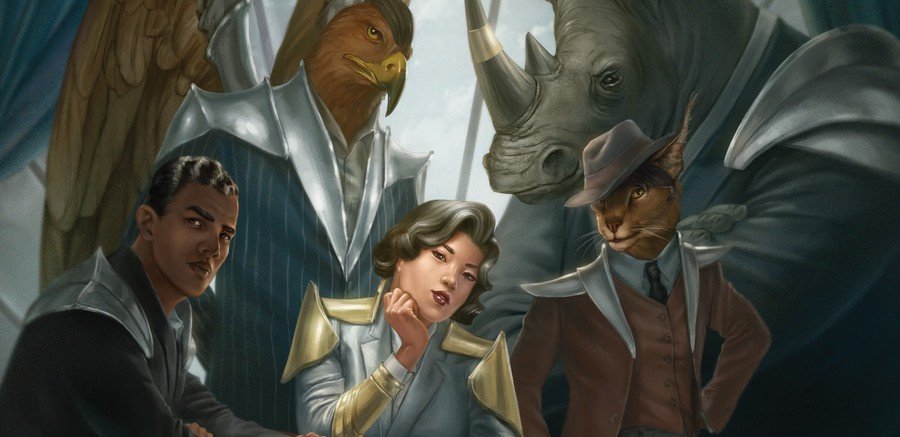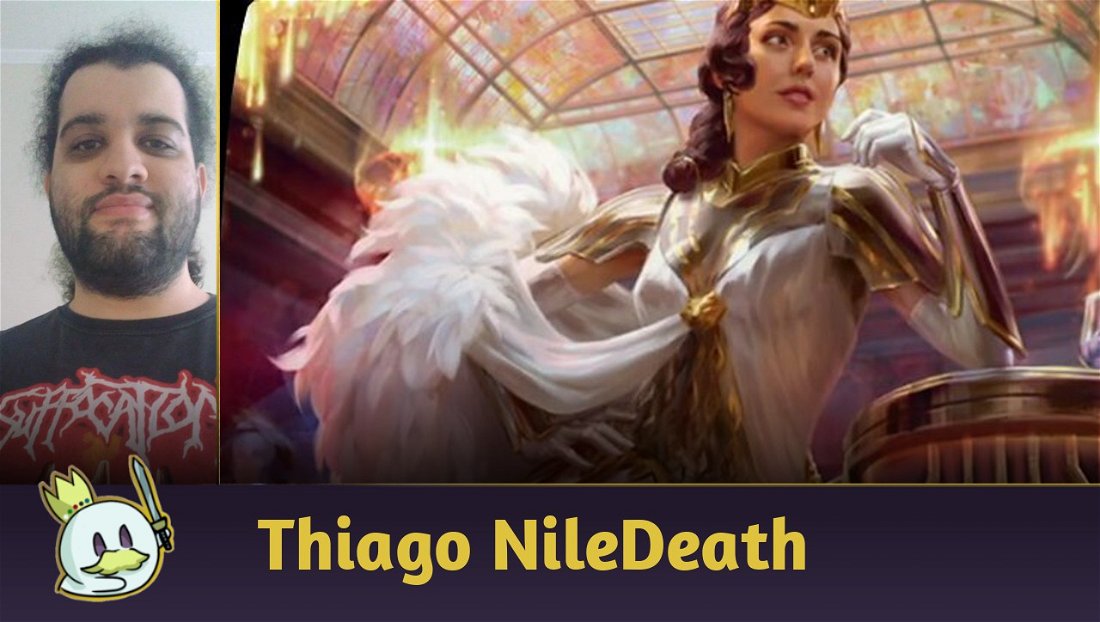Last Wednesday, we were surprised by a sudden banned & restricted announcement for Explorer, which removed the following cards from the format:

It was already a common consensus that both Winota, Joiner of Forces and Tibalt's Trickery would likely need to be banned at some point, and perhaps the surprise was solely that the two-week timing was, while accurate, unexpected.
How will the format develop from now on? We will try to find some answers to this question.
Ad
About the Bans
First, it's important to note that these bans are temporary until Explorer fully becomes Pioneer in Magic Arena.

Tibalt's Trickery is one of the weirdest cards ever created in Magic: The Gathering, and absolutely nothing involving it to date has been really healthy for competitive formats. It's not that the archetype is good or oppressive in the competitive landscape, it's just not fun or healthy to exist, especially in the Best of One scenario.
I firmly believe that the red “counterspell” should be given a tabletop errata, something players tend to loathe, but which would make sense given that, again, nothing fair is really done with Tibalt’s Trickery. If we changed the text to target only opponent's spells, we could probably consider occasional uses for it without having to ban it from so many competitive formats (I mean, it's even banned from Modern for offering an unfun play pattern).
As archetypes aimed at using Tibalt's Trickery on any 0 mana artifact to cast absurd things for free in the first few turns of the game like Ulamog, the Ceaseless Hunger or Genesis Ultimatum did a lot of damage on the Best of One ranked, but were irrelevant in the Best of Three scenario, I don't believe their absence will affect the Metagame that much, but it will definitely create a more "safe and fun" environment to play without worrying about an opponent just trying to squeeze the “free win” button in all games as soon as on turn 2.

Now, Winota is an entirely different story, and maybe approaching this ban will make us understand how much her presence in Pioneer is or isn't healthy for the Metagame.
I think Explorer will be a healthier place without the former best deck in the format today because the clock imposed by it was simply too complicated to counter-interact playing Aggro or to hold efficiently when looking to play fair against your opponents. There simply wasn't a world where a fair deck in Explorer could easily compete against Naya Winota, and it was impossible to play under it when Prosperous Innkeeper and several efficient blockers prevented the player from attacking and setting a swift clock.
You can check out my Deck Guide if you want to understand better how the list operated (and get an idea of how to pilot it on Pioneer, where it is still legal), but we need to emphasize the emerging and recurring problem of recent years and how this strategy fits into that question.
Hybrid Combo decks will always break formats.
When we think of Combo lists, we usually consider the following possibilities:
A) A list that has a sequence of pieces to fit the combo and requires many maindeck slots to do so, as in the case of Jeskai Ascendancy and Lotus Combo in Pioneer (both still absent in Explorer due to the lack of certain key-pieces).
B) A combination of two or three cards that complement a specific strategy, with all the pieces being useful both inside and outside the combo scenario, allowing the archetype to obtain the desired result by dedicating few slots to it and thus giving it the flexibility for an efficient plan B.
Ad
Naya Winota obviously falls into the second category — We're talking about a list that operates like a proactive Midrange, with ramp and 2-for-1 effects that can turn the game in your favor as you extract value from your permanents and which also has a plan that can win the game absolutely out of nowhere with a single card and some complementary pieces.
That is, the deck manages to play a “fair game” with ease while threatening to close the game with a combo. And if that sounds familiar, it's because it really is:
Combo hybrids have a long history at Pioneer, especially leading, in 2020, to a dark episode where it was entirely geared towards specific combos.
In its composition, Naya Winota doesn't operate much differently than the Mono-White Devotion did before Walking Ballista was banned, where the combo was validated by the constant threat that it could occur, while the archetype managed to operate well without it. The crucial difference is that while these combos were a two-card combo that led to instant victory, Winota, Joiner of Forces depends on more cards to be relevant, like mana dorks or tokens, and there is always the real possibility of combo failure if you reveal the wrong cards, while Heliod, Sun-Crowned + Walking Ballista was a guarantee of winning the game.
That is, the opponent has more opportunities to respond and interact against Naya Winota than any player has ever had to deal with Mono White Heliod or Dimir Inverter, and that coupled with the larger card pool and faster combos in the game. Pioneer might justify Winota, Joiner of Forces staying in the format, although I faithfully believe that a ban on her is a matter of when and not if because she is, fundamentally, a broken card.
This spectrum becomes even more problematic in the other category, Combo-Control, which allows the player to manipulate the course of the match through efficient disruptions and a strong card selection, covering the weakness that Control lists often have - needing too much time to finish the opponent off, exactly where faster archetypes can prey on it. A combo wincondition can easily end the game as early as turn 5, as was the case with Dimir Inverter, establishing a very adaptable archetype to the Metagame which forces the rest of the format to play around it in more ways than it should.
The thing is, in the current scenario and as we've seen in the past with archetypes like Splinter Twin, any combo that finds a consistent base that supports it while being able to play a fair game and where some combo piece isn't horrible on their own and/or don't take a millennium to work, which is why a combo like Crackling Drake with Kazuul's Fury isn't exactly a Tier 1, it will break a competitive format if there are no counterweights to balance things out.
The Post-Ban Explorer
Now that we've discussed bans, we need to assess how the format should behave from now on, so here are my thoughts on what I expect from Explorer in the coming weeks.
Ad
Mardu/Esper Greasefang is the most absurd thing you can do now
If you, like me, love playing with absurdities and strategies on the verge of being broken, lists that seek to take advantage of the Greasefang, Okiba Boss and Parhelion II combo are your best bet.
Greasefang lists work similarly to Winota lists (although less explosive and being forced to use a bad card to create a good combo), but operate in the disruptive Midrange or Combo-Control category rather than having a more proactive plan, allowing for greater interactions and less focus on needing to respond to individual cards or combo more confidently than when pressured by an aggressive backup.
That said, since it's the next absurd thing to do in Explorer, I recommend respecting this combo with answers like Rest in Peace or Unlicensed Hearse, and maybe even some useful artifact hate on the maindeck like Kolaghan's Command.
I've been playing Mardu Greasefang since the Metagame Challenge, so you can expect a Deck Guide soon.
Fair Aggro looks better but still lacks good Pioneer cards
I believe that other winners of the most recent bans are the fair Aggro decks that now have greater security and space to play under like Mono Red Aggro, or similar, or to produce a good clock with efficient trades, as with Gruul Aggro.
Unfortunately, there are still critical pieces missing for many Pioneer Aggro lists to migrate to Explorer, such as Monastery Swiftspear, Mausoleum Wanderer, some humans, Elvish Mystic, among others, and this could hinder the development of this category until the next Historic Anthology comes out.
Control can now focus less on early game
Control lists will need to adapt again, but the Metagame scenario is relatively favorable for Azorius, Dimir or Esper to be able to create lists that care less about the early game and more about the long-term development that many strategies can adopt now.
Winota's absence favors Midrange
Midrange decks greatly benefit from the absence of hybrid combos because their mere existence is a problem for any archetype that works around responding to fair decks with 1-for-1 trades.
Among them, I believe Rakdos Midrange is the safest option because it offers a balanced game against the most varied strategies, while also having a high quality of threats and responses in the current format pool.
Strategies geared towards the famous Cat-Oven are probably also solid options for the future Metagame, and I think Jund Food could stand out in this regard if the format slows down and demands more value-oriented games.
Izzet Phoenix will have more space to shine
Finally, with the absence of Naya Winota, I believe that Thing in the Ice becomes less essential and Izzet Phoenix can prevail even without this piece, in particular due to the inclusion of the Streets of New Capenna sleeper, Ledger Shredder.

Ad
Although we still lack some main options from the Pioneer version, such as Treasure Cruise and Temporal Trespass, this new creature interacts incredibly well with Phoenix's proposal and could fit nicely into the two-drop slot.
In addition to that, there is a huge redundancy regarding the spells that Izzet Phoenix can use, added to the fact that the absence of spells with Delve makes room for other powerful bombs, such as Finale of Promise and Dreadhorde Arcanist, creating a scenario where it becomes possible to establish a consistent and competitive list that is on par with the rest of the Metagame, even though this strategy can still suffer against go-wide strategies such as Selesnya Angels.
Conclusion
In addition to these speculations, several other directions can be taken, and it is possible that Streets of New Capenna still surprises us in terms of new archetypes appearing in Explorer, or even that the absence of certain cards that are considered "fun police", such as Eidolon of the Great Revel and the absence of quick combos collaborate for the emergence of strategies that will become an exclusive element of the digital format until we have access to more Pioneer staples.
Either way, I'm excited to see how players adapt to these changes.
Thanks for reading!








— Comentarios0
Se el primero en comentar